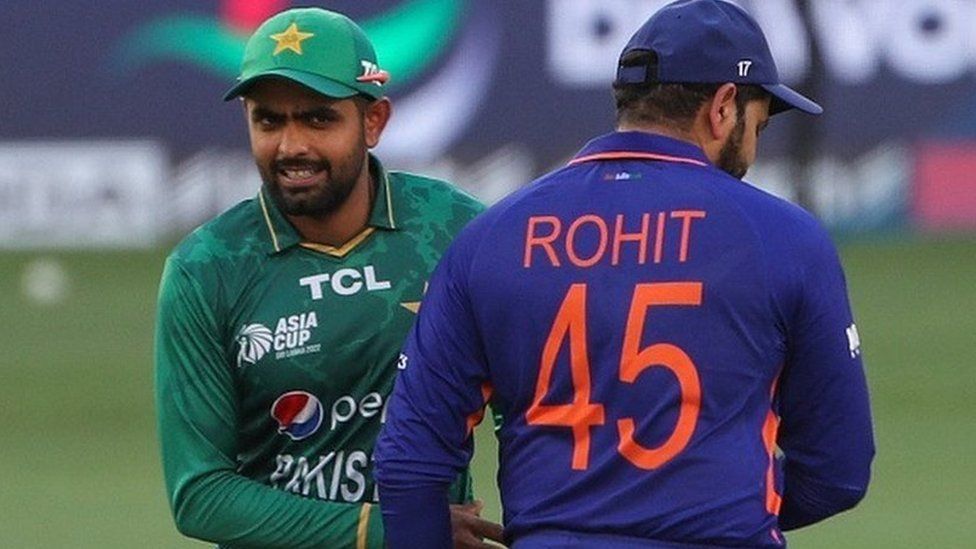Cricket’s World Cup and Asia Cup seem to exist merely to allow India and Pakistan to play each other. They don’t meet in either country, and there is always a huge television audience.
Tensions between the nuclear-armed South Asian neighbours have always impacted their cricketing ties. The two sides have not played a bilateral series since 2012.
But Pakistan need India to survive as a cricketing nation – something their neighbours don’t shy away from reminding them – while India need Pakistan to complete themselves as a successful team.
They are the best of enemies who exemplify for each other one of sport’s most crucial must-haves: the great rival. Victory and defeat are part of a continuing dance – now led by one team, now by the other.
It is easy to get cynical about the fear of defeat and the excesses of victory. But you can’t deny the essential competitiveness of the teams with some of the greatest players in the world.
No one complains about schedules like at the 16th Asia Cup where the teams meet on Saturday.
India and Pakistan are grouped together, assuring television audiences of at least one match between them. They are placed alongside qualifiers Nepal, the weakest team in the three-team group where two qualify for the “Super Four” round robin (each competitor will play against every other team), thus ensuring the teams meet twice.
The hope that they meet for a third time in the final underlies all such planning. Contrived scheduling is part of cricket’s multi-team tournaments, where other teams might feel like bit players.
India and Pakistan can be seen as mirror images of each other; two countries divided by a common culture, emotions manipulated, passions whipped up to sell TV advertisements and to keep politicians in their jobs.

History, geography, economics, psychology have all played roles in kneading India-Pakistan relations into different shapes at different times.
In Pakistan, former captain Shahid Afridi once had a legal notice served on him in the Lahore High Court for saying he is loved more in India.
In India, 67 students were suspended from a university in Meerut for cheering on Afridi during an Asia Cup match. They were threatened with sedition charges before wiser counsels prevailed.
Cricket should not carry the baggage of unsorted relations. But it does.
Sport is often called to stand for something other than itself; India-Pakistan cricket is anointed with a significance far beyond its status as a sporting encounter.
A win or loss cannot be seen as a comment on a country’s political system, literary heritage, beauty queens, or the strength of their dams. But it is.
On Saturday, Pakistan and India will meet at a neutral venue in Sri Lanka. That is the only way India would have agreed to play in a tournament hosted by Pakistan. Administrators around the world know that even if India speak softly, they carry a big cheque, and therefore will be heard.

Both countries have similar problems – an overdependence of batting at the top as the middle order appears shaky, and a bunch of fine fast bowlers.
Iftikhar Ahmed’s brutal century against Nepal might have plugged a hole for Pakistan while Babar Azam’s liquid batting might provoke even Virat Kohli fans into hoping he gets lots of runs in a Pakistan defeat.
If India play Ishan Kishan at No.3 both for his left-handedness and for his attacking style, and drop Virat Kohli to number four from where he can control the middle order, some of the lop-sidedness of their batting might be addressed, especially since K L Rahul is recovering from an injury and will miss the game.
None of the top five batsmen bowl, and that is a handicap, as is the lack of a consistent hitter in the bottom half.
Forced to play their best team in their first match, India might be loath to experiment even if progress to the next stage is virtually guaranteed. They will speak of taking it one step at a time, not looking too far ahead and going into each match trying to win – cliches they have often spouted.
The only match they need to win is against Nepal (who lost to Pakistan) – so Saturday’s match is their best chance to try something fresh.
The result doesn’t matter for either team, except that for these teams every result matters whatever be the bigger picture.
BBC News India is now on YouTube. Click here to subscribe and watch our documentaries, explainers and features.

Read more India stories from the BBC:
- Why India’s soaring food inflation is a global problem
- What has India’s rover been up to on the Moon?
- India lodges ‘strong protest’ over new China map
- G20 to deter Delhi monkeys with cut-outs and mimicry
- Putin tells India PM Modi he won’t attend G20 summit

